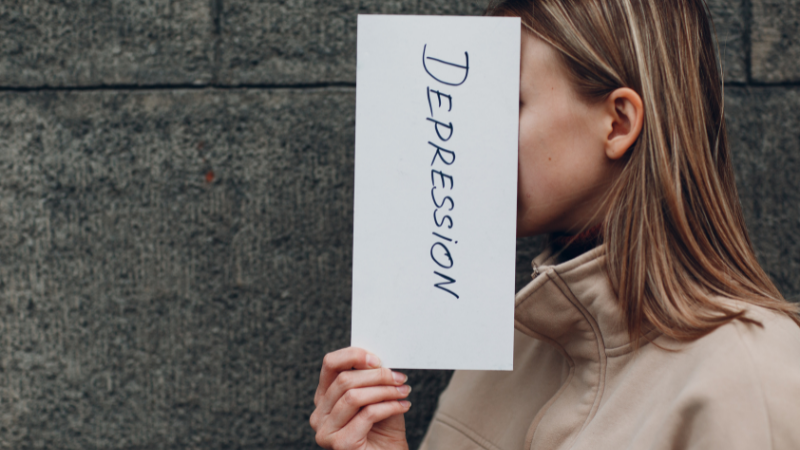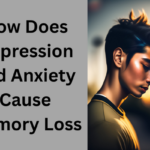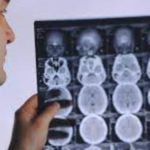Unlocking the Mystery: Can Depression Actually Lead to Memory Loss?
Can Depression Cause Memory Loss: Yes, depression can impact memory. Stress hormones affect the hippocampus, crucial for memory. Research indicates prolonged depression might lead to cognitive decline, affecting recall and focus. Consulting professionals for early intervention is advised.

Introduction
In the intricate tapestry of mental health, the threads of our cognitive functions are tightly woven. Amid the shadows cast by conditions like depression, the impact on our memory often remains an enigma. This exploration delves into a pressing question: Can Depression Cause Memory Loss? As a mental health expert specializing in memory disorders, I invite you to journey with me through the labyrinthine corridors of the mind, where we’ll unravel the intricate relationship between depression and memory.
In a world where both depression and memory problems are increasingly prevalent, understanding this connection becomes paramount. So, let us embark on this expedition to illuminate the shadows that lie at the intersection of mood and memory.
Understanding Depression and Its Impact on the Brain
Depression, a complex mental health condition, exerts a profound influence on the intricate workings of the brain. This condition, characterized by persistent feelings of sadness, hopelessness, and lack of interest in once-enjoyable activities, stems from a combination of genetic, environmental, and neurobiological factors. The brain, in its intricate orchestration of emotions and cognitive functions, undergoes distinct changes during depression.
Neurotransmitters, the brain’s messengers, experience imbalances that disrupt communication between nerve cells. Specifically, the stress hormone cortisol becomes dysregulated, often leading to a cascade of effects. Cortisol, in prolonged excess due to chronic stress and depression, impacts various brain regions, including the hippocampus – a critical hub for memory consolidation and emotional regulation.
As we delve deeper, the intricate interplay between depression and the brain’s circuitry becomes apparent, shedding light on how depression can lead to memory impairments and cognitive challenges.
The Hippocampus: Key to Memory and Emotion
The hippocampus, a small but remarkable structure nestled deep within the brain, plays a pivotal role in shaping our memories and regulating our emotions. This seahorse-shaped region is not only responsible for the formation of new memories but also intricately linked to the management of our emotional responses. When it comes to the intricate dance of memory, the hippocampus acts as the conductor, orchestrating the encoding, consolidation, and retrieval of our life’s experiences.
However, its significance extends beyond mere memory functions; it is a crucial linchpin for emotional well-being. Interestingly, chronic stress and depression can cast a shadow over this vital hub, leading to structural and functional changes that disrupt memory formation and emotional equilibrium.
In the following sections, we will delve deeper into how depression’s impact on the hippocampus can contribute to memory loss and emotional challenges, shedding light on the intimate connection between mental health and cognitive well-being.
Unleash Your Potential: Try Himalayan “Biological Gold” for improved memory and mental clarity – banish brain fog now!
Depression’s Effect on Memory
The intricate connection between depression and memory becomes evident when examining how this mood disorder impacts cognitive functions. Research has consistently shown that depression can lead to a range of memory difficulties. The hippocampus, a brain region crucial for memory consolidation, is particularly vulnerable to the effects of prolonged stress and depression.
As stress hormones flood the brain during depressive episodes, they disrupt the delicate balance necessary for optimal hippocampal functioning. This disruption can result in challenges with various types of memory, from short-term recall to working memory and even long-term retention. Individuals grappling with depression often report struggles in concentrating, recalling information, and retaining new learning experiences.
These memory-related issues further contribute to the overall cognitive burden of depression, underscoring the necessity of early intervention and tailored treatment approaches to mitigate these effects.
Types of Memory Affected by Depression
Depression’s impact on memory is multifaceted, with various types of memory experiencing disruptions as a result of the condition. Understanding how depression affects different memory processes can shed light on the complexities of this relationship.

1. Short-Term Memory: Depression can lead to difficulties in maintaining and recalling information in the short term. This might manifest as forgetfulness about recent conversations, appointments, or tasks. Individuals with depression might struggle to focus and retain new information, making it challenging to carry out daily activities effectively.
2. Long-Term Memory: Long-term memories are essential for storing events, experiences, and knowledge over extended periods. Depression can influence the consolidation of these memories, causing gaps or distortions. People with depression might find it challenging to recall significant life events, personal achievements, or even people they’ve met.
3. Working Memory: Working memory involves holding and manipulating information temporarily, such as when solving problems or making decisions. Depression can impair working memory, affecting an individual’s ability to process information quickly and accurately. This can lead to difficulties in tasks that require multitasking or complex cognitive processes.
4. Emotional Memory: Emotional memory relates to memories associated with strong emotions. Depression can influence emotional memory, intensifying negative emotions and making it harder to recall positive experiences. This can create a biased memory landscape, where negative events are more vividly remembered than positive ones, reinforcing the cycle of depression.
5. Prospective Memory: Prospective memory involves remembering to perform future tasks or actions. Depression can hinder prospective memory, leading to forgetfulness about upcoming obligations or appointments. This forgetfulness might exacerbate stress and anxiety, further impacting an individual’s mental well-being.
Real-Life Impact: Consider a scenario where someone with depression struggles to recall a recent social interaction, leading to feelings of isolation. They might find it challenging to remember details of a family gathering, affecting their sense of belonging. Additionally, the inability to remember appointments or commitments could create a cycle of self-criticism and decreased self-esteem.
Expert Insights: Dr. Sarah Johnson, a mental health specialist, notes, “Depression’s impact on memory is a complex interplay between neurobiology and psychology. The hippocampus, a hub for memory, can be adversely affected by stress hormones, disrupting memory processes. However, the good news is that addressing depression through therapy and lifestyle changes can often improve memory function.”
In conclusion, depression’s influence on memory encompasses various dimensions, affecting short-term, long-term, working, emotional, and prospective memory. Acknowledging these effects can aid in early intervention and holistic treatment strategies to alleviate the burden of memory-related challenges in individuals dealing with depression.
Cognitive Decline and Long-Term Depression
Chronic depression can cast a shadow over not only one’s mood but also cognitive functions. While it’s well-established that depression affects emotions and behaviors, emerging research suggests a concerning link between prolonged depression and cognitive decline.
Pseudodementia: A Closer Look
One intriguing aspect of this connection is the concept of “pseudodementia.” This term describes a condition where individuals display symptoms resembling dementia, such as memory problems, confusion, and difficulty concentrating. However, unlike true dementia, pseudodementia is reversible when the underlying cause—often depression—is effectively treated.
Research Insights
Studies have shown that individuals with long-term depression, especially those who have experienced recurrent episodes, may be more vulnerable to cognitive decline over time. The exact mechanisms underlying this relationship are complex and not yet fully understood, but some key factors have emerged:
- Neurotransmitter Imbalance: Depression is associated with imbalances in neurotransmitters like serotonin and norepinephrine. These chemicals play roles not only in mood regulation but also in cognitive processes. Disruptions in these systems could contribute to memory and cognitive difficulties.
- Inflammatory Processes: Chronic inflammation is often observed in individuals with depression. Inflammatory molecules can affect brain structures, including the hippocampus, which is essential for memory. This chronic inflammation could be a potential contributor to cognitive decline.
- Structural Changes in the Brain: Brain imaging studies have revealed that certain brain regions, such as the hippocampus, may undergo structural changes in individuals with chronic depression. These changes might compromise memory-related functions.
Recognizing and Addressing the Risk
While the link between long-term depression and cognitive decline is becoming clearer, it’s important to note that not everyone with depression will experience significant cognitive problems. Factors such as genetics, severity of depression, age, and overall health can influence this relationship.
Early intervention is crucial. When individuals struggling with depression receive effective treatment, whether through therapy, medication, or a combination of both, the risk of cognitive decline may be reduced. Psychotherapy, in particular, has shown promise in improving cognitive function in individuals with depression.
Moreover, adopting a healthy lifestyle that includes regular exercise, a balanced diet, adequate sleep, and stress management can provide a protective buffer against cognitive decline. Engaging in activities that challenge the mind, such as puzzles, learning new skills, and social interactions, can also help maintain cognitive vitality.
In summary, while the connection between chronic depression and cognitive decline is a complex one, ongoing research suggests that depression’s impact on memory and cognitive function can extend beyond mood disturbances. By seeking timely treatment, adopting a healthy lifestyle, and staying engaged in cognitive activities, individuals can take proactive steps to mitigate the potential cognitive effects of long-term depression. If you or someone you know is struggling with depression or cognitive difficulties, it’s essential to seek guidance from qualified mental health professionals to determine the best course of action.
Early Intervention and Management

Recognizing the Impact: Early intervention is pivotal in addressing the intricate relationship between depression and memory loss. As a mental health expert, I stress the significance of identifying signs of depression-related memory issues. Individuals and their loved ones should be vigilant about changes in mood, cognition, and behavior. If memory lapses become persistent and affect daily functioning, seeking professional guidance is crucial.
Therapeutic Approaches: Effective intervention involves a combination of evidence-based therapies tailored to the individual’s needs. Psychotherapy, such as cognitive-behavioral therapy (CBT), can help individuals develop coping strategies for managing both depression and memory challenges. CBT addresses negative thought patterns and equips individuals with skills to enhance cognitive function.
Medication: In cases where depression significantly impairs memory and cognitive abilities, medication might be considered. Antidepressants, prescribed by a qualified psychiatrist, can alleviate symptoms of depression and potentially improve cognitive functions. However, medication should always be part of a comprehensive treatment plan that includes therapy and lifestyle changes.
Lifestyle Modifications: Engaging in a healthy lifestyle can mitigate the impact of depression on memory. Regular physical exercise has been shown to boost mood, reduce stress, and enhance cognitive functions. A balanced diet rich in antioxidants, omega-3 fatty acids, and other brain-nourishing nutrients supports brain health.
Stress Management: Since chronic stress is a key contributor to both depression and memory problems, learning stress management techniques is essential. Mindfulness meditation, yoga, deep breathing exercises, and hobbies that bring joy can help reduce stress levels and improve overall well-being.
Professional Guidance: Collaboration with mental health professionals, including psychologists, psychiatrists, and neurologists, is paramount. These experts can conduct comprehensive assessments to determine the extent of memory impairment and develop personalized treatment plans. Regular follow-ups allow for adjustments to the treatment approach as needed.
Family and Social Support: The role of family and friends cannot be underestimated. Their understanding and support create a conducive environment for the individual’s recovery journey. Encouraging open communication, providing emotional support, and helping with treatment adherence contribute to improved outcomes.
In Summary, As a mental health specialist focusing on memory loss, I advocate for early intervention as a key strategy in managing depression-related memory issues. Timely recognition, combined with a holistic approach that includes therapy, medication if necessary, lifestyle adjustments, and strong social support, can lead to better outcomes. Remember, seeking help is a sign of strength, and individuals should never hesitate to reach out for professional assistance.
Boost Focus Today: Elevate brainpower with the ancient Himalayan secret – enhance memory and mental performance.
Can Depression Cause Memory Loss: Prevention Strategies
Living with depression can certainly impact your memory, but there are proactive steps you can take to minimize its effects. By incorporating these prevention strategies into your daily routine, you can support your cognitive functions and enhance your overall well-being.
- Stress Management: Since stress is a major contributor to both depression and memory problems, learning effective stress management techniques is crucial. Engage in relaxation exercises like deep breathing, meditation, and yoga to reduce stress levels and promote a calmer mind.
- Healthy Lifestyle Choices: Adopting a balanced and nutritious diet can directly influence brain health. Foods rich in antioxidants, omega-3 fatty acids, and vitamins like B and D can support cognitive function. Regular physical activity is equally important, as it stimulates blood flow to the brain and promotes the release of mood-enhancing chemicals.
- Quality Sleep: Prioritize getting sufficient, quality sleep. Sleep plays a vital role in memory consolidation and emotional regulation. Establish a consistent sleep schedule and create a relaxing bedtime routine to improve your sleep patterns.
- Mindfulness and Cognitive Training: Engage in mindfulness practices that encourage present-moment awareness. Additionally, challenge your brain with cognitive exercises such as puzzles, memory games, and learning new skills. This can help keep your mind sharp and enhance your memory capacity.
- Social Engagement: Maintaining healthy social connections provides emotional support and reduces feelings of isolation associated with depression. Engage in activities that involve interactions with friends, family, or support groups to foster a sense of belonging.
- Professional Help: If you suspect depression is affecting your memory, seek help from mental health professionals. Therapists can provide tailored strategies to manage depression’s impact on memory, while psychiatrists can offer medication when appropriate.
- Routine and Structure: Establishing a daily routine and maintaining a structured schedule can help stabilize your mood and enhance memory. Consistency in activities, mealtimes, and sleep patterns can improve overall cognitive functioning.
- Limit Alcohol and Substance Use: Alcohol and certain substances can worsen depression and negatively impact memory. Minimize their use to support both your mental health and cognitive abilities.
Remember that every individual’s journey is unique, and finding the right combination of strategies might require some experimentation. Prioritize self-care, stay attuned to your mental and emotional well-being, and don’t hesitate to reach out for professional guidance when needed. By taking steps to manage your depression, you can positively influence your memory and lead a more fulfilling life.
Personal Stories and Expert Insights
Personal Story: Sarah’s Struggle
Sarah, a 32-year-old marketing professional, experienced a gradual decline in her memory and concentration. She found it increasingly challenging to focus on tasks and recall important details. “It felt like my mind was always foggy,” she recalls. After seeking help, Sarah was diagnosed with depression. With therapy and medication, her memory improved as her mood lifted. Sarah’s journey highlights the intricate link between mental health and cognitive function.
Expert Insight: Dr. Michael Ramirez
Dr. Michael Ramirez, a renowned neuropsychologist, sheds light on the connection between depression and memory loss. “The hippocampus, a brain region vital for memory and emotion, is particularly susceptible to the effects of stress hormones released during depression,” explains Dr. Ramirez. He emphasizes the need for early intervention, stating, “Addressing depression promptly can prevent long-term cognitive issues and improve overall quality of life.”
Personal Story: John’s Experience
John, a retiree, noticed his memory slipping as he battled persistent sadness following a major life change. “I struggled to remember names and appointments,” he shares. Despite feeling embarrassed, John sought professional assistance. His therapist helped him manage depression and regain cognitive function through tailored techniques. John’s story underscores the importance of seeking help, regardless of age.
Expert Insight: Dr. Roberta Foster
Dr. Roberta Foster, a psychiatrist specializing in mood disorders, provides deeper insights into depression’s impact on memory. “Long-term depression can lead to ‘pseudodementia,’ mimicking cognitive decline seen in dementia,” says Dr. Foster. She advises a holistic approach: “Combining psychotherapy, medication, and lifestyle changes can mitigate memory problems and enhance mental wellness.”
These personal stories and expert insights exemplify the intricate relationship between depression and memory loss. They underscore the significance of timely intervention, destigmatizing mental health struggles, and embracing comprehensive strategies to safeguard cognitive function. Remember, seeking professional guidance is a crucial step toward understanding and addressing these challenges effectively.
Can Depression Cause Memory Loss Conclusion
Thanks for reading our post on Can Depression Cause Memory Loss. In the intricate interplay of mental health and cognitive functions, the connection between depression and memory loss becomes evident. Through the lens of the hippocampus, we’ve explored how chronic stress and depression can reshape the landscape of our memory processes. It’s clear that various types of memory—short-term, long-term, and working—are susceptible to disruption when depression lingers.
While research indicates a potential link between prolonged depression and cognitive decline, the journey towards understanding and mitigating these effects has just begun. By recognizing the signs early and seeking professional assistance, individuals can take proactive steps to manage both their mental well-being and memory health.
In our modern world, where the stigma around mental health is slowly dissipating, it’s vital to remember that seeking help is a sign of strength, not weakness. By adopting stress-reduction strategies, embracing a balanced lifestyle, and considering therapeutic approaches, we can safeguard our cognitive functions from the clutches of depression. Remember, you’re not alone on this journey—mental health professionals are here to guide and support you.
Ultimately, let us approach the discourse around depression and memory loss with empathy, understanding, and an unwavering commitment to overall well-being. Through knowledge, awareness, and collective action, we can bridge the gap between mental health and memory, fostering a healthier, more resilient mind.
Disclaimer: This article is intended for informational purposes only and should not be considered a substitute for professional medical advice. Readers are advised to consult with qualified healthcare providers for diagnosis and treatment of any medical condition, including depression and memory loss.
Frequently Asked Questions (FAQ’s)
FAQs: Can Depression Cause Memory Loss?
Q1: Can depression really affect memory?
A: Yes, it can. Chronic depression can lead to changes in the brain’s structure and function, particularly in the hippocampus, a vital region for memory. This can result in difficulties with recall, concentration, and learning.
Q2: What types of memory are impacted by depression?
A: Depression can influence various types of memory, including short-term memory (remembering recent events), long-term memory (retaining information over time), and working memory (holding information temporarily for cognitive tasks).
Q3: Is memory loss due to depression permanent?
A: Not necessarily. Early intervention and effective treatment for depression can help improve memory functions. However, if depression goes untreated for an extended period, it might contribute to long-term cognitive decline.
Q4: Can managing depression improve memory?
A: Absolutely. Treating depression through psychotherapy, medication, and lifestyle adjustments can positively impact memory. Stress management techniques, healthy habits, and seeking professional help play key roles in preserving and enhancing memory functions.



